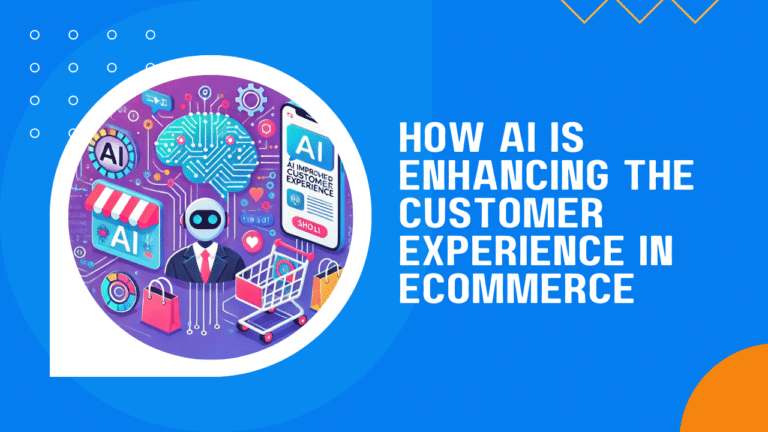Artificial intelligence (AI) is redefining customer experience and service in ecommerce, offering personalized interactions, quicker responses, and more intuitive shopping journeys. From AI-powered product recommendations and dynamic pricing to intelligent chatbots and sentiment analysis, AI technologies are transforming how online retailers engage with and support customers. By automating routine tasks and providing real-time insights into customer behavior, AI enables ecommerce businesses to offer seamless, tailored experiences that drive customer satisfaction and loyalty. This article explores how AI is being used to elevate the customer journey, improve service quality, and ultimately enhance the overall user experience in the ecommerce space.
Personalization and Customer Experience
AI’s ability to deliver highly personalized shopping experiences is transforming the ecommerce landscape, creating deeper connections with customers and boosting sales. As online shoppers increasingly expect individualized interactions, AI’s real-time data analysis enables ecommerce businesses to offer tailored experiences that meet these expectations.
Personalized Product Recommendations
AI algorithms analyze a variety of customer data—browsing history, purchase patterns, demographics, and even engagement on multiple channels—to deliver relevant product recommendations. This targeted approach drives customer satisfaction and loyalty. For example:
- Amazon’s recommendation engine, which drives up to 35% of its total revenue, uses AI to generate personalized suggestions based on users’ preferences, making cross-selling and upselling more effective.
- AI-powered personalization mimics the browsing experience seen in platforms like Netflix, presenting users with related products based on their wishlists, abandoned carts, or previous purchases.
This level of personalization improves engagement by offering a more intuitive shopping experience, boosting conversion rates and average order values. Additionally, by creating an experience that feels tailored to individual tastes, AI helps increase customer retention—encouraging repeat visits and building brand loyalty.
Dynamic Pricing for Enhanced Customer Satisfaction
AI also enhances personalization through dynamic pricing, which allows ecommerce businesses to adjust prices in real-time based on factors such as demand, competitor pricing, and customer behavior. This AI-driven strategy delivers several benefits:
- Maximized revenue, as AI increases prices during high demand or lowers them to clear slow-moving stock.
- Competitive edge, with AI automatically adjusting prices to remain attractive compared to rivals.
- Improved customer trust and satisfaction, as dynamic pricing ensures customers receive fair, market-aligned prices.
Retailers like Walmart and eBay use AI-powered pricing algorithms to stay competitive while maintaining profitability. These dynamic adjustments cater to both immediate customer needs and business goals, creating a balanced pricing experience that encourages repeat purchases.
AI-Driven Customer Segmentation
AI refines customer segmentation by analyzing data from multiple touchpoints—website behavior, social media interactions, and purchase history—resulting in highly detailed customer profiles. This granular segmentation allows for:
- Hyper-targeted campaigns, enabling marketers to deliver highly relevant ad campaigns and promotions.
- Customized website experiences, where AI adapts layouts, promotions, and product displays to match customer profiles.
- Higher retention rates, as re-engagement campaigns like tailored discounts or restock alerts keep customers returning.
By offering personalized journeys based on AI-driven segmentation, ecommerce platforms can ensure seamless customer experiences that enhance satisfaction and foster repeat business.
AI-Enhanced Real-Time Personalization
AI’s real-time personalization capabilities allow for immediate adjustments to recommendations, promotions, and pricing based on user behavior during a single shopping session. For instance:
- AI tools can modify homepage layouts to feature products that match the customer’s browsing history.
- As customers interact with the site, AI adapts to their preferences, showing related products or services that improve the user experience and increase engagement.
Real-World Examples of AI-Driven Personalization
- Amazon not only personalizes product suggestions but also adjusts homepage layouts, dynamic pricing, and targeted marketing campaigns, resulting in stronger engagement and higher conversion rates.
- Alibaba uses AI to deliver personalized recommendations, AI-powered virtual fitting rooms, and chatbot interactions, enhancing overall user experience.
- Spotify’s Merchbar integration personalizes merchandise recommendations based on users’ music tastes, driving engagement and increasing sales.
By offering tailored experiences at every touchpoint, AI not only enhances customer journeys but also strengthens relationships, creating a more satisfying and memorable shopping experience.
Customer Service Enhancements
AI is transforming customer service in ecommerce, enabling faster, more responsive, and personalized interactions that meet modern customer expectations. With tools like AI-powered chatbots, virtual assistants, and sentiment analysis, ecommerce businesses can deliver 24/7 support and optimize service quality.
AI-Powered Chatbots and Virtual Assistants
AI-powered chatbots are revolutionizing customer service by providing immediate, 24/7 support that automates routine inquiries and assists customers throughout their shopping journey. AI chatbots in ecommerce can:
- Answer common questions regarding orders, returns, product availability, and more.
- Offer personalized product recommendations, enhancing the shopping experience while guiding users toward purchases.
- Proactively engage customers, sending tailored messages based on abandoned carts, browsing patterns, or previous interactions.
This automation not only improves customer satisfaction by delivering faster responses but also allows human agents to focus on more complex issues. For instance:
- eBay’s ShopBot engages customers in personalized conversations to help them find products, while also offering customized deals.
- H&M’s AI chatbot guides customers through product selections by narrowing down options based on style and size preferences, acting as both a shopping assistant and service agent.
By providing real-time, accurate responses, AI chatbots ensure that customers receive the support they need quickly, reducing frustration and increasing overall satisfaction.
Advanced Sentiment Analysis for Proactive Service
AI’s use of sentiment analysis helps businesses understand customer emotions across communication channels, including emails, social media, and live chats. AI-driven sentiment analysis offers several benefits:
- Early identification of dissatisfaction, enabling proactive interventions to resolve potential issues before they escalate.
- Prioritized responses to negative reviews or complaints, ensuring that customers receive immediate attention, which improves brand reputation.
- Continuous monitoring of customer sentiment trends, providing insights that help refine service strategies and address pain points effectively.
For instance, by monitoring real-time feedback on platforms like Twitter, brands can identify emerging issues (like shipping delays) and respond quickly to prevent negative experiences. This empathetic approach builds customer trust and loyalty.
AI-Driven Omnichannel Support
AI enhances customer service by creating seamless omnichannel support, integrating data across platforms like chat, email, phone, and social media to ensure consistent user experiences. This approach includes:
- Unified customer profiles, allowing agents to access complete histories across channels for more accurate and personalized responses.
- Predictive assistance, with AI tools anticipating customer needs based on past interactions and offering timely solutions.
- Automated workflows, routing customer inquiries to the right departments or agents, reducing wait times and improving satisfaction.
For example, Zappos uses AI to create consistent service experiences across phone, email, and social media, enhancing customer interactions and response times.
Real-World Examples of AI-Enhanced Customer Service
- Sephora’s chatbot not only assists customers with product recommendations but also offers makeup tutorials and beauty tips, increasing user engagement and service quality.
- Alibaba’s AliMe chatbot handles over 90% of inquiries during high-traffic events like Singles’ Day, ensuring rapid responses and improved customer satisfaction.
- Domino’s AI-powered order tracker provides real-time updates, allowing customers to follow their order’s progress, which enhances transparency and satisfaction.
AI’s Impact on Customer Retention
By providing faster, more personalized, and more accurate support, AI significantly boosts customer retention rates. Satisfied customers are more likely to return and recommend the brand to others. AI’s ability to monitor and respond to customer feedback in real-time ensures that ecommerce businesses can continuously refine their service strategies, ultimately enhancing both loyalty and sales.
Final Thoughts: How AI is Elevating E-commerce Customer Experiences
AI is revolutionizing customer experience and service in ecommerce, offering tailored interactions, faster responses, and seamless support across multiple channels. From personalized recommendations and dynamic pricing to AI-powered chatbots and sentiment analysis, these technologies not only meet but exceed modern customer expectations. By delivering real-time, individualized experiences and 24/7 support, AI fosters stronger customer relationships, improves satisfaction, and drives long-term loyalty.
E-commerce businesses that embrace AI-driven personalization and customer service solutions are better positioned to thrive in an increasingly competitive digital landscape. As AI continues to evolve, it will enable even more efficient, responsive, and engaging customer journeys, ensuring that brands can effectively cater to customer needs and remain at the forefront of the ecommerce industry. For companies looking to enhance their customer strategies, investing in AI is no longer optional—it is essential for achieving sustained growth and customer satisfaction.









